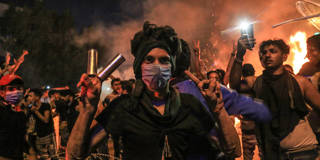Following mass uprisings in Algeria and Sudan this summer, protesters have now taken to the streets in Lebanon and Iraq to demand better economic conditions and an end to mis-governance. Though the situation today has obvious parallels to the 2011 Arab Spring, there are also crucial differences.
BEIRUT – A new wave of revolts is shaking the Arab world, with Lebanon and Iraq now joining Sudan and Algeria. Recent mass protests in each country have mobilized millions of people from all walks of life, all of whom are angry over the deterioration of economic conditions, which is seen as being exacerbated by mismanagement and poor governance.
As during the 2011 Arab Spring, today’s protests in each country have coalesced around demands for regime change. But there is a key difference: while people’s yearning for dignity fueled those earlier uprisings, today’s protests are propelled by people’s hunger. The Arab Spring has given way to a harsh winter of discontent.
Back in 2011, oil prices were at a peak, and many Arab economies were growing at their fastest pace in decades. Those leading the uprisings were predominantly educated young people who aspired to better jobs and more of a voice in politics and society. Many of the region’s governments were able to calm the streets with the help of expansionary economic policies financed by oil revenues, support from Gulf Cooperation Council countries, and remittances.

BEIRUT – A new wave of revolts is shaking the Arab world, with Lebanon and Iraq now joining Sudan and Algeria. Recent mass protests in each country have mobilized millions of people from all walks of life, all of whom are angry over the deterioration of economic conditions, which is seen as being exacerbated by mismanagement and poor governance.
As during the 2011 Arab Spring, today’s protests in each country have coalesced around demands for regime change. But there is a key difference: while people’s yearning for dignity fueled those earlier uprisings, today’s protests are propelled by people’s hunger. The Arab Spring has given way to a harsh winter of discontent.
Back in 2011, oil prices were at a peak, and many Arab economies were growing at their fastest pace in decades. Those leading the uprisings were predominantly educated young people who aspired to better jobs and more of a voice in politics and society. Many of the region’s governments were able to calm the streets with the help of expansionary economic policies financed by oil revenues, support from Gulf Cooperation Council countries, and remittances.